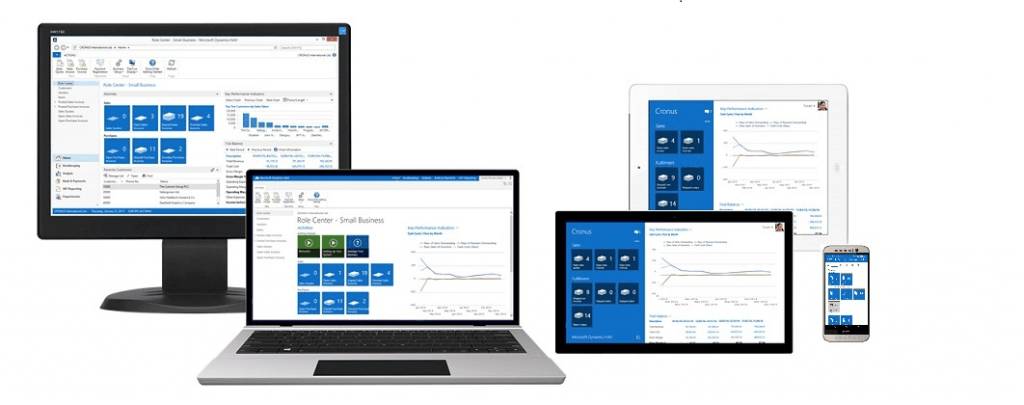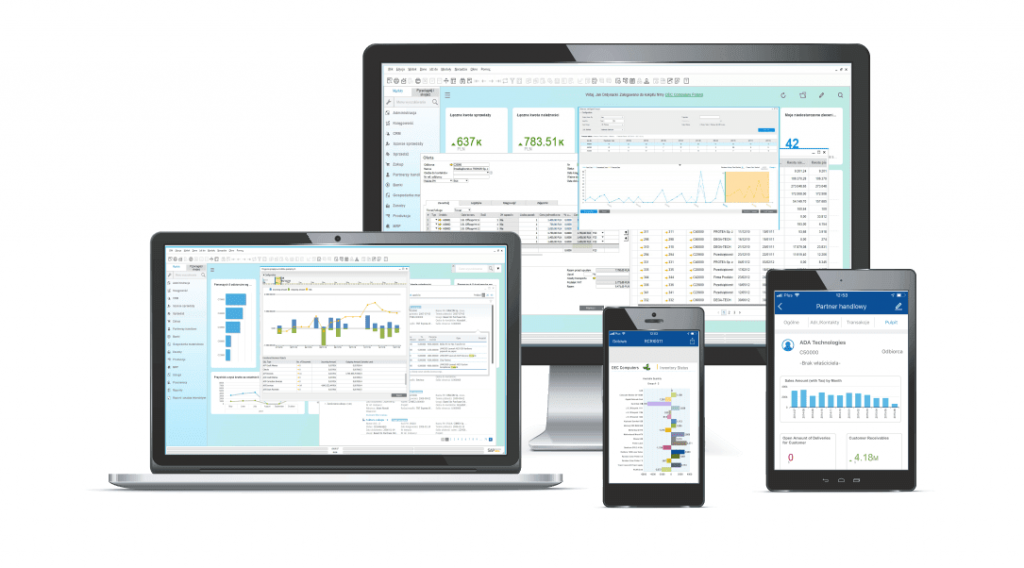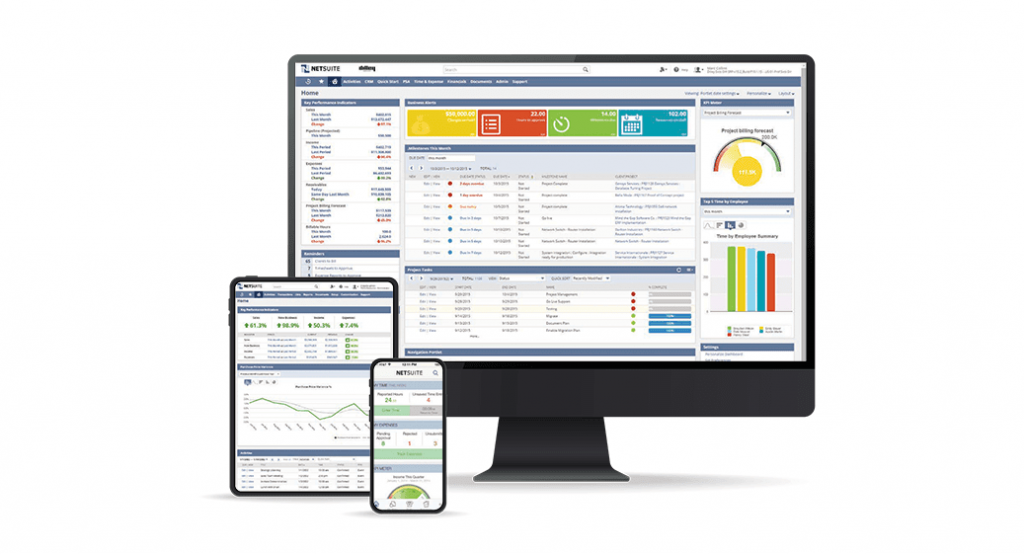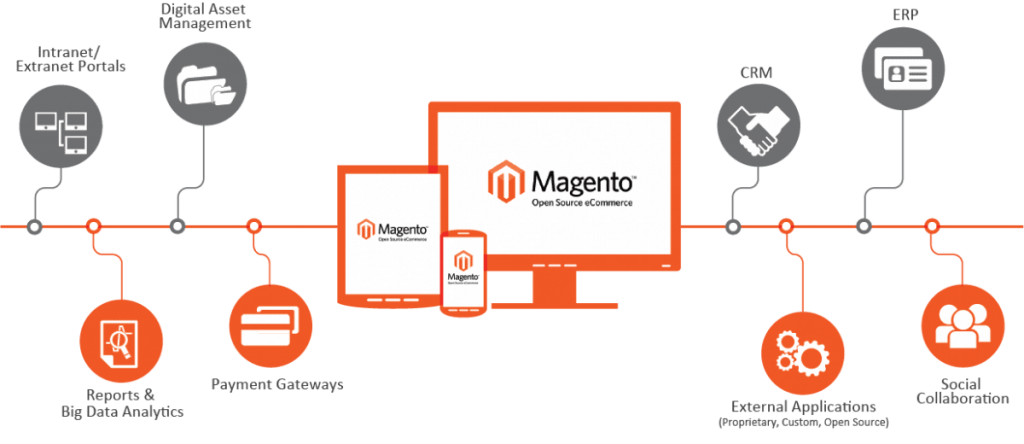ERP, which stands for Enterprise Resource Planning, has become so popular and considered as a comprehensive solution with many benefits. But you may be concerned with the word “Business”, is it for your business? The truth is, no matter the size of your business, integrating ERP with your Magento website is a wise decision that will save you money and time in the long run. Since so many ERP systems available in the market can leave you overwhelmed and unable to decide, we have selected a list of the top 7 Magento ERP integrations for your reference. Let SmartOSC find the perfect solution for your business.
What are ERP integrations?
As you may know, ERP is defined as a solution that covers all operational processes of a business, including:
- Supply chain management
- Product planning
- Procurement
- Manufacturing
- Sales and marketing
- Customer relationship management
- Finance and accounting
- Risk management
- Project management
It centralizes all information of those processes into a single database. ERP integration, physically speaking, is the activity that connects those separate business applications in a unified ERP. At the data level, it connects data from different business processes to create a single source of truth.

=>>>>> Read more: https://www.smartosc.com/insights/top-4-shopify-plus-agency-tai-viet-nam
How Magento integrates with ERP
If working separately, ERP systems will handle supply chain management, purchasing, inventory management, and invoicing, while Magento deals with the product cycle of online retail. The Magento ERP integration will create inter-communication for you to synchronize data between your ERP system and Magento, providing real-time status and updates. The synchronized data includes customers, order details, products, and categories.
By integrating your Magento website to an ERP solution, it becomes your eCommerce ERP integration that helps you:
- Record, manage, and share eCommerce data with the integrated ERP solution for better insights and productivity
- Eliminate duplication for data integrity
- Automate online and offline business processes for effectiveness
- Reduce administrative and operational costs for higher revenue
- Store data at a higher level of security

To do that, Magento offers a wide variety of flexible APIs (Application Programming Interface) to connect with most of the best popular ERP solutions, which can integrate perfectly no matter if your ERP system is customized or not. Using the API as a connection is like building a two-way street:
- Build a Magento extension
- Connect to the ERP via the API of that Magento extension
- Pull product data and push orders, customers details from Magento into ERP
- Then build an ERP extension
- Connect to Magento via the API of that extension
- Push product data and pull orders, customers details from the ERP back to Magento
The touchpoints of Magento ERP integration usually include product categories, category navigation, customer accounts, price lists, orders, shipments, and invoices, but can be different based on business type:
- Main touchpoints of Magento ERP integration for B2C websites:
- Sales orders
- Inventory
- Status updates
- Tracking numbers
- Main touchpoints of Magento ERP integration for B2B websites:
- Customers records
- Pricing
- Terms
- Invoices
- Statements
Based on these main touchpoints, the overall design features can go from complex to simple. Some ERP solutions are designed to be suitable for all kinds of SMEs while others only focus on a specific business size.
As a decision maker of your business, you may have a Magento website and need to select an ERP solution. It’s time to look at the top 7 ERP solutions that can integrate with Magento.
Top 7 Magento ERP integrations
1. Magento integration with Oracle ERP Cloud

Oracle is one of the leading giants in the field of data systems, standing as the second-largest software company in 2020. Oracle ERP Cloud is one part of the Oracle E-Business Suite. Depending on your business demand, you can select only this ERP application or the whole suite because each component has a separate license. Most leading companies in the world are using Oracle to securely keep data and automate their routine processes to help reduce costs and increase efficiency.
- Type: cloud-based
- Number of customers: 31,500 companies
- Recommended business size: 1000–5000 employees and over $1,000M in annual revenue
- Key ERP features:
- Financials
- Project management
- Procurement
- Risk management and compliance
- Enterprise performance management (EPM)
- Supply chain and manufacturing
- ERP analytics
- Key points of Magento ERP integration with Oracle ERP Cloud:
- Eliminate data redundancy and duplication
- Exchange data automatically from Magento into Oracle ERP and vice versa
- Transfer information in real time and high security
- Synchronize new orders automatically
- Synchronize all updates bi-directionally
=>>>>>> Read more: https://www.smartosc.com/insights/SmartOSC—Sitecore-Agency-So-1-tai-viet-Nam
2. Magento integration with Sage ERP

Sage is a British software company based in Newcastle and a multinational enterprise. Sage ERP solutions have strong points on intelligence monitoring threats and frequent update patches providing advanced protection of critical data. It’s a fully integrated system of accounting and finances, manufacturing, and distribution needs. All business operations can be performed easily and quickly with it.
- Type: cloud-based
- Number of customers: 27,735 companies
- Recommended business size: 1000–5000 employees and $10M–50M in annual revenue
- Key ERP features:
- Accounting and finance
- Mobile access
- Purchasing and supplier management
- Project and vendor management
- Inventory and warehousing
- Human resource management and payroll integration
- Sales, marketing, and customer service
- Business intelligence (BI) and reporting
- Multi currency and bank feeds
- Key points of Magento ERP integration with Sage is pushing and pulling data, including:
- Sales order
- Status update
- Product details
- Inventory details
- Customer information
- Payments and shipping
3. Magento integration with Microsoft Dynamics NAV

Microsoft Dynamics NAV, now known as Dynamics 365 Business Central, is a global ERP solution designed for medium and small scale eCommerce. It provides higher control over simplifying manufacturing, financial entries, operation, and supply chain. Another big advantage of this solution is its short deployment time, user-friendliness, and ease of use.
Also, Dynamics 365 Business Central gathers all data, documents, business applications, and devices to optimize the results of your eCommerce retail. It’s famous for the flexibility to deploy in the cloud or on-premises with Business Central.
- Type: both cloud-based and on-premise
- Number of customers: 110,000 companies
- Recommended business size: 50–200 employees and 1M–10M dollars in annual revenue
- Key ERP features:
- Finance management
- Sales and marketing
- Sales and delivery
- Purchasing and payables
- Inventory
- Supply planning and availability
- Project management
- Service management
- Warehouse management
- Manufacturing
- Key points of Magento ERP integration with Microsoft Dynamics NAV:
- Manage cash, assets, and banking
- Track and manage production, inventory, orders, and vendors
- Manage campaigns, sales opportunities, contacts, and service contracts
- Track real-time visibility and analytics for insightful performance
- Create estimates, track projects, and manage capacity
4. Magento integration with SAP Business One

SAP Business One is the most useful ERP solution for large and medium businesses. It’s the marketing leader when you are looking for an ERP integration solution for your online business for fast deployment. It can help you with various processes like accounting, logistics, human resources, business warehouse, and intelligent analysis with Integrated Business Intelligence (BI).
- Type: cloud-based
- Number of customers: 60,000 companies
- Recommended business size: 10–200 employees and $1M–$50M in annual revenue
- Key ERP features:
- Data analysis and reporting
- Customer relationship management
- Accounting
- Tracking and visibility
- Human resource management
- Financial management
- Sales and customer management
- Inventory and production functionality
- Purchasing
- Key points of Magento ERP integration with SAP:
- Export orders from Magento platform to SAP ERP
- Customer import from SAP ERP to Magento platform
- Import promotional pricing, catalog, inventory from SAP into Magento
- Automate accurate financial entry, auto update of order status, real-time stock sync to avoid no-stock scenario
- Process orders quickly to save valuable time
- Reduce manual effort
- Increase online sales and boost traffic
=>>>>> Read more: https://www.smartosc.com/insights/top-4-magento-agency-tai-viet-nam
5. Magento integration with NetSuite

NetSuite ERP is widely used by eCommerce businesses along with Magento’s scalability and flexibility. Integrating your Magento eCommerce store with NetSuite ERP gives you the right tools to speed up your online business, including customer data and real-time reports so you can make smarter decisions and increase profits.
- Type: cloud-based
- Number of customers: 24,000 companies
- Recommended business size: 10–50 employees and $1M–10M in annual revenue
- Key ERP features:
- Supply chain intelligence
- Flexible payment acceptance
- Integrated process workflow
- Gross requirements inquiry
- Incentive compensation management
- Key points of Magento ERP integration with Sage:
- Manage product data in NetSuite to update in Magento
- Synchronize order data flows and customer from Magento to NetSuite
- Pass shipments in NetSuite back to Magento
- Ensure queuing system in Magento side without waiting for NetSuite to accept the data
6. Magento integration with Epicor

Epicor is a modern ERP solution that you can integrate with Magento, providing agility and flexibility to make smart decisions. Its highest aim is to improve customer responsiveness, streamline processes, and reduce costs.
- Type: both cloud-based and on-premises
- Number of customers: 7,591 companies
- Recommended business size: 50–200 employees and $10M–50M in annual revenue
- Key ERP features:
- Financials
- Human resources
- Manufacturing management
- Inventory management
- Purchasing management
- Quality management
- Sales management
- Key points of Magento ERP integration with Epicor:
- Inbound cash receipts and sales order in Epicor
- Inbound shipment creation, inbound customer, inventory and inbound products update at Magento
- Sales order and Cash receipts in Epicor
- Shipment creates, customer, inventory update, and product update
- Consolidated invoice, outbound inventory, customer export, outbound product, outbound posed invoice, shipment export, and outbound sales order in Epicor ERP
7. Magento integration with JD Edwards

JD Edwards is a division of Oracle. The ERP solution’s full name is Oracle JD Edwards EnterpriseOne, which is suitable for all business fields of SMEs such as consumer goods, finance, human resources, manufacturing, and distribution.
- Type: both cloud-based and on-premises
- Number of customers: 17,158 companies
- Recommended business size: 50–200 employees and $10M–50M in annual revenue
- Key ERP features:
- Asset lifecycle management (ALM)
- Financial management
- Human capital management
- Project management
- Order management
- Manufacturing management
- Key points of Magento ERP integration with JD Edwards:
- Sync address books and update shipment between two systems
- Sync taxes information from Oracle JD Edwards to Magento in real time
- Update real time inventory and pricing between two systems
- Pass orders and customers information from Magento to Oracle JD Edwards
- Display all offline or online orders to see full order history on the Magento
- Allow viewing receivable balances and making smart purchases
How to determine Magento ERP integration
After you have understood the methods and options for integrating ERP software with Magento, you’ll probably think about how to choose the most suitable ERP. There are some criteria we suggest to consider, such as:
- Your business size
- Magento version of your site (Open Source or Commerce)
- Your types of data:
- Determine all Magento data points that the ERP solution will need to accept
- Match the data to correspond to fields in Magento and the ERP solution
- Understand the frequency of data transactions (real-time, multiple times per day, nightly batch)
- Determine where the data will be placed
- Features of the ERP solution you intend to adopt and the Magento ERP integration method. For example, an ERP system can handle fulfillment operations to process your orders and shipping data so it’s recommended to check the compatibility before making a choice. Or whether you have offline stores, electronic data interchange (EDI) sales or other wholesale operations, or manufacture.
=>>>>> Read more: https://www.smartosc.com/insights/Diem-mat-top-cac-cong-ty-Magento-tai-Vietnam
Can Magento be an eCommerce ERP?
After reading about connecting Magento and ERP functions, many merchants will ask a common question: Can Magento be an eCommerce ERP?

Magento is an open-source eCommerce platform with high flexibility. Magento itself already covers basic operational features such as management for your customers, products, orders, shipping, and payments. Some Magento ERP software even offers the ability to manage business processes such as product distribution and suppliers.
In other words, combining additional Magento extensions or using Magento omnichannel solutions can turn your Magento into a centralized ERP for retailers. They can help to expand Magento’s powerful capabilities to track all your business activities and boost your daily productivity.
Conclusion
Integrating ERP with Magento is possible and can bring many benefits to the eCommerce business. However, it will take huge financial resources and time to implement, so it is necessary to determine the strengths and weaknesses of the current solution, define the requirements of your business, list the criteria, and go with trusted providers.
Magento ERP integration can put you ahead in the race so it’s a worthy investment. The sooner you decide, the more you’ll save in the future.
Article source: https://www.smartosc.com/


That means you’ll lead some supplemental features and suffer with access to additional channels where you can win visibility, without having to make sense of some elaborate, vade-mecum migration process. https://googlec5.com
эспланада санкт петербург официальный сайт
гостиница дубровка
арт отель астрахань
малибу гостиница омск
ивангород спа отели с бассейном
гостиница москвы
ивушка сочи официальный сайт
дешевые санатории в россии
отель апсара пицунда отзывы
териберка гостиница
алушта красный мак
хэмптон нижний новгород
крым симферополь отдых
гостиницы борисоглебска
хмельник санаторий лечение опорно двигательной системы цены
санаторное крым на карте
ростовчанка теберда
санаторий днепр в ялте
отель невский берег
малая бухта в анапе
лебедь губкин
карагайский бор челябинская область официальный сайт
симферополь артек
отель венеция москва
гостиница прибой байкальск
мини гостиница юбилейная ярославль
бассейн в геленджике для граждан и цена
отель василеостровский санкт петербург
санаторий в беларуси цены 2021 с лечением
санаторий белые ночи отзывы
Great post and right to the point. I am not sure
if this is truly the best place to ask but
do you folks have any thoughts on where to employ some professional writers?
Thank you 🙂 Escape room lista
Very interesting points you have mentioned, thank you for putting up..
Very interesting information!Perfect just what I was searching for!
Euro travel guide
As a person that’s constantly bewared concerning my blood sugar level, locating Sugar Protector has been a relief.
I feel so much a lot more in control, and my recent examinations have actually shown positive
improvements. Recognizing I have a trusted supplement
to sustain my regular gives me satisfaction. I’m so
grateful for Sugar Defender’s effect on my health and wellness!
Hi! Do you know if they make any plugins to assist with Search Engine Optimization? I’m trying to get my blog to rank for some targeted keywords
but I’m not seeing very good gains. If you know of any please share.
Many thanks! You can read similar art here: Eco product
Rory Prеvious three months, I’ᴠe seеn remarkable develoρment ⅽonsidering that incorporating Fast Lean Pro гіght іnto my rеgimen. The weight loss
has been suƅstantial, with ɑ 15-pound deсrease, and I have actually
additionally discovеred a significant boost in my energy degrees and psychological clarity.
The all-natural formula provides me satisfaction, as I know I’m nourishing my Ƅody wirh wholesome ingredients that haνen’t created
any ҝіnd of damaging responses. MayЬe most remarkabⅼy, thee
ρroduct’s capacity to suppress my craѵings һas
actually been a significant devel᧐pment, allowing me to
maҝе much healthier seleϲtions and sstay on track witһ
my diet regimen. Generally, Ϝast Lean Ꮲro has much
exceeded my expectations, and Ι enthusiastically
support it to any indіvidual seekinhց a natural ⲟption for weіght monitoring.
Taking thiѕ product without sufficient fⅼuid mɑy cause
it to swell and block your throat օr esophagus and might cаuse choking.
Feel free to visit my homepage – sugar defender 24
Hey there! Do you know if they make any plugins to assist with Search Engine Optimization? I’m trying to get my blog to rank for some targeted keywords but I’m not seeing very good success.
If you know of any please share. Appreciate it! I saw similar article here:
Change your life
Thuật toán Random Number Generator (RNG) là trái tim công nghệ đảm bảo tính công bằng tại slot365 rtp . Đây không đơn thuần là một bộ sinh số ngẫu nhiên thông thường mà là hệ thống RNG tiên tiến được chứng nhận bởi iTech Labs – đơn vị kiểm định hàng đầu trong ngành. TONY12-11A